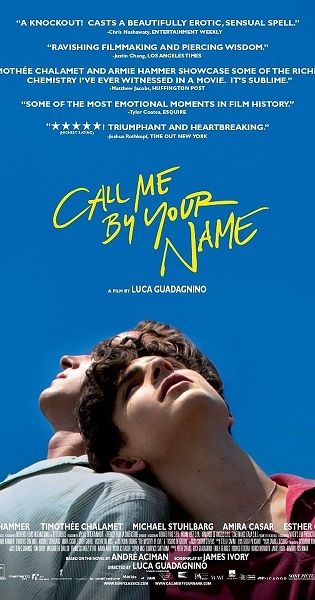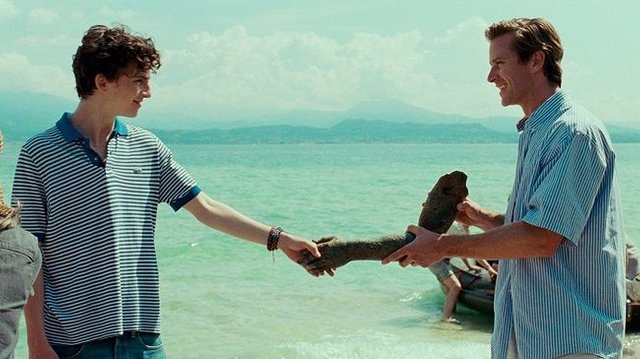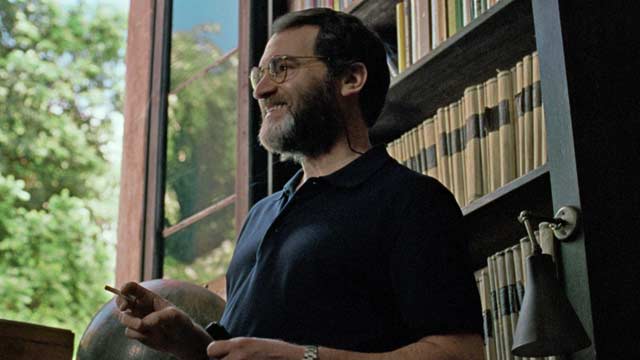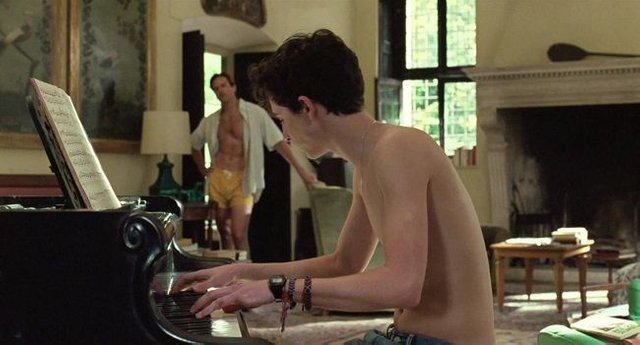Call Me by Your Name movie review

Ten-minute applause after the Sundance Film festival. Director Luka Guadanino enters a twitter and reads how after his film people are jumping and dancing on the streets. Of these types of movies, they are rare and create euphoria in some people that does not quench for months. Last year it was "American Honey". Both are spectacles for the senses-gentle guys whose vision is electrifying, the feeling they leave is more true to the truth than the one we face everyday. "Call Me by Your Name" is a film about Love, which transforms life into an event and radiates such an emotional charge, it itself is an event. 24-year-old American student Oliver (Army Hammer) is staying in a summer internship in his native Italian villa of professor of archeology, the American-Italian American-French American Professor Perlman (played by Michael Stulbarg, whose Oscar nomination for supporting male role I hope is a fact in a few months). The atmosphere in the house is a cohesive idol - Perlmani are a family of dreams - highly educated beautiful people who speak freely about philosophy, history and linguistics and kiss and hug in the corridors of their house every time they pass away. The son of Professor Elio (an impressive debut as Timothy Shalame) is a 17-year-old spiritual and talented boy: he spends his days studying classical music, reading books, riding a bicycle and going out in the evening at the bars in the town. "Call Me by Your Name" begins directly with the event-connection: Oliver's arrival. He is impressively handsome and confident, the ancient Greeks have a word about it - Calokatia: when the visual and moral beauty are in absolute synchronicity. In the first minutes of the film, he is adored by each of the heroes (except for Perlman, there are also minor characters, the most important of which is Elio's girlfriend, the Frenchman Marcia, played by Esther Garel).
What happens afterwards is magic: Ellio's love for Oliver goes through several recognizable stages, which are shown on the screen with a masterful light from the camera: it slides between the characters as if blowing in the wind. (Behind the camera is Saudi Mbudiyprom, a Thai man who also worked with Apicolapong Virasetakul over the dream-mysteriously-visually perfect "Uncle Bune, who remembers his past lives", awarded with "Golden Palm" at the Cannes 2010 festival.) In an interview director Luca Guadanino says: "We had a Buddhist behind the camera. And this is visible in every frame. " To be able to convey my thoughts in order, I will divide the text into five parts corresponding to the five states of the protagonist Elio in the three weeks until love develops between him and Oliver. It's an attempt to decipher the power of the film, which I believe is rooted in the absolutely brilliant passage through the universal emotions of love sentiment. "Call Me by Your Name" displays the inner world of a loving and the most inviting, most intense state through which his fascinated-minded soul can pass. I include several quotes from Roland Bart's "Fragments of Love Discourse," which to me is the most poetic and refined transformation of love emotion into words. Not to be interesting, but to give you pleasure (because Barth's text is that!) This film is the same rendering, more accessible, but not less subtle and moody. For at least a year, I had never seen a love story that touched me with its naturalness. One of the greatest qualities of the film is its script: it lacks antagonist and conflict. In a textbook, this scenario was not written. This is risky, some would say wrong. For example, there is no classic Romeo-Juliet problem when an external force interferes with love, nor is there a serious hesitation in any of the characters. Nobody dies. No one is poorer than the other, no one is whiter or more black than the other. We look at two people who fall in love, define heaven, and believe me, this is one of the most exciting narrative stories.

Desire
This is the third and final film of Luka Guadanino's trilogy, inspired by the common theme of Desire. The previous two are "I'm Love" and "Big Spanking". In the words of the director, the first is a tragedy, the second is a farce, the third is an ideal. While in the two previous films there is some tragic comical element, which is a warning consequence of desire, in "Call Me by Your Name" there is no such thing. Here to love does not mean anything bad. Pain after loss is not harmful. The film begins with Elio's naked to the cross, who must quickly release his room, where guest Oliver will be sleeping. The house where Elio lives is spacious, cozy (the doors are always open, and kitchen dishes are constantly being cooked) in which room to enter there are books to read under the huge windows that pass through the rich afternoon sun. Everyday life is a delightful delight. The viewer sees this and sits down in his seat, his head squeaked with longing. Why is not my life as well? "Call Me by Your Name," it manages to touch a string, often untouched in ours: the melancholy of the unspent paradise, ripe under the lasciviousness of the blessed nature, kissed from the sky hidden from the dusty, dusty city. Sexual desire is not claimed right away. The scene where Elio and Oliver first met, for example, was shot rather unconventionally for such a type of narrative. The classic version of love at first glance is to see on screen (usually in middle or close-up) the reaction of the protagonist, the one who falls in love first. Here, however, the scene is as follows: through the half-open door, Elio and Oliver are hunted. Elio is in the back, Oliver's face is a polite, tired smile. BAM! Nothing special. No escalating music or slow motion. Simple.
Anxiety
When we can not possess something, we are obsessed with a fragment of it. Once Elio is aware of love, Oliver is missing. He takes his wheel and gets lost for one day. Elio is alone in the house, returns to his room and looks at the dwelling place of the beast. This is his own room, but altered forever: he is intruded by the presence of the one who is now gone. There are one or two great frames in which the camera focuses on Oliver's wet baths, which hang from the bathroom faucets. Elio picks up a pair of them, lying on the bed and blowing his head inside. This is the only one he is capable of possessing. Only part of, and not the real, body of Oliver. This makes him nervous and frightened, but at the same time brings him incomparably with another pleasure. When is the pleasure confusing? Love is maddening: it tears you away from you and transmits you into the power of something abstract like Thought, Aroma, Imagine. Elio is lost in the Other's maze. And for the first time in the movie we hear the music of the wonderful Sufyan Stevens at a time of culminating anxiety. The stage is distinctive: Elio's face is blurred, and it's like a movie strip. Elio is not part of his own life, but a projection of the collective centuries-old image of Love: the one caught in the trap of the sticky charm. Subsequent scene: Elio is with his parents, the three are sitting on the couch, he has a head on his mother's lap. She reads from some French romance the story of the princess and the knight; the knight is so in love with the princess that he does not know what to do. The horror he feels about his own feelings escalates into the replica: "Talk or die." This shakes Elio, who realizes that the choice is really extreme. The scene marks a major dramatic situation. The lover is facing a ditch: on one side he is alone, like a boy bent with a frightened look over the abyss, a large, dignified man standing on the other side. Can he skip the ditch?

Michael Stuhlbarg
Heroism
According to Joseph Campbell, in every story in which we have a prominent protagonist there is a moment of initiation, the moment the boy, taking on some challenge, takes the path of his maturation. For Harry Potter this is his departure for the Hogwarts magical school, for example. What does Elio do to become a man? Elio decides to speak. Despite all the horror of this action - putting yourself in a weak position, risking being misunderstood and humiliating, Elio demonstrates courage and decides to confess. Courage, because confession is self-defense, and this is one of the most manly things to do: "I'm here and I feel that way. Are you like me? "As probably all the readers know this text, telling someone that you love it without knowing if it will turn your feelings is hard and painful. It can cost a lot of nerves, especially if one is bloody in the spirit of high classical ideals. And Elio spoke. God, how good this scene is. Maybe I'm more fond of even the last 10 minutes of the movie. The scene is brilliantly conceived and shot: Elio and Oliver rotate on both sides of a monument in honor of those who died in the First World War battle. They talk about history, and Oliver admired how much Elio knows. Then Elio, who gathered the courage, says he knows nothing. Not for the important ones. "What important things?" Asks Oliver. "You know who," says Elio after a thoughtful pause. He tells him everything without telling him anything. Among them is the story - the stone monument, the symbol of suffering and the epic - and the no less important event rages: The conversation.
Atonement
The fourth part of "Call Me by Your Name" shows the true relationship of the two, after love has already been declared as a fact. It feels like the longest part. It is right to be, considering that it is a romantic film that is not specified by the genre limitation of either drama or comedy. The title refers to that part. "Call Me by Your Name" is a replica that Oliver gives to Elio and which actually carries the whole charge of their relationship: the true merger is when you do not distinguish yourself from the other, being so in love, sinking in the other. This is the culminating moment: you are one with your Desire, and your Desire is one with you. There is no conflict, no drama. The world is only one long touch. The quest for a complete merger: the whole world says that this dream is impossible, yet it holds on it. I also do not let him go. "On the stars of Athens, in the place of heroisation of the dead, scenes of good-bye, where one of the husbands farewell to the other, clasped hands, as if a contract is pronounced, only a third force can destroy - so the mourning in expressing feelings . I'm no longer without you. "It's just that I imagine mourning is the proof of my dream; I can trust her because she is dead. (the only immortality impossible).

Reckoning
The last, fifth part, in which Oliver leaves, has almost an instructive function. The father is the figure of the wise, the teacher (literally and literally). He must evaluate the event and interpret its meaning. He is the person who studies the art and character of the people over the centuries, the way in which humanity declares itself. Still, he is a man who admits that he has never been so close to the perfection of human relations as his 17-year-old son. The discovery of the father is striking: In the absence of love, one gets lost. In the absence of courage to love, one fades. Again, this brilliant monologue deserves an Oscar nomination. There are movies that are magic. Do not hesitate that "Call Me by Your Name" is one of them. And to quench the swollen pathos, I will tell you that the peach scene has been tested (in living life) by both Luca and Timothy Shalame. One can enjoy the most unexpected places!
Nice post,thanks.
You are welcome